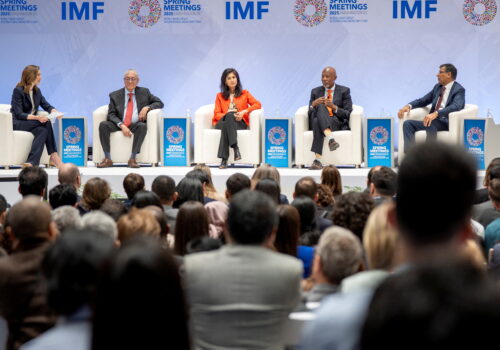A milestone on Argentina’s long road to recovery
Expectations regarding the potential success of Argentina’s economic reforms continue to rise. But do these expectations match reality? The International Monetary Fund (IMF) seems to think so. On July 31, its executive board completed the first review of Argentina’s Extended Fund Facility signed back in April. The result was a positive one for Buenos Aires: The multilateral institution praised Argentina’s strong policy implementation, and it unlocked a new two-billion-dollar disbursement. IMF Managing Director Kristalina Georgieva commended the government’s “zero-overall deficit target,” noting that “it remains the key policy anchor.”
In December 2024, as President Javier Milei of Argentina was wrapping up his first year in office, we wrote that those initial twelve months would be remembered as a surprisingly strong start to an ambitious reform agenda, urgently needed for a country mired in crisis and stagnation. That statement remains true today. From adhering to his promise of fiscal discipline to further liberalizing Argentina’s economy, Milei has defied the odds set by the bedeviled economy that he inherited, and he has helped place Argentina back on track. Though the road to long-term growth remains full of uncertainties, Argentina has recovered a sense of optimism, one that had been absent for years.
Inflation and poverty have fallen in tandem
Milei came into office with two clear objectives: first, to repair Argentina’s chronically mismanaged public finances and, second, to end money-supply-driven inflation. Coupled with deep reform of an overregulated economy riddled with preferential regimes and price distortions, the Milei government’s objectives were designed to unleash Argentina’s productive potential, ending more than a decade of economic stagnation. So far, the results are promising; for example, a June monthly inflation rate of just 1.6 percent. Argentina’s annualized inflation rate is now under 21 percent, and it is likely soon to drop below the annual rate of around 20 percent under former President Alberto Fernández, who was in office from 2019 to 2023.
The battles against inflation and poverty are not over, but the trends are headed in the right direction. As a further sign of the ongoing decline of inflation, the government lifted sizable elements of the country’s preexisting currency and capital controls, known as the cepo, this past April. These controls were a major roadblock for the economy. The loosening of exchange rate rules, which is also a condition under the current IMF agreement, is a sign that the government is slowly moving away from the exchange-rate anchor it has used to battle rising prices. This is a positive sign for future growth, as the full elimination of these distortions is essential for long-term growth.
The economy has also rebounded even as government spending falls
Defying the conventional wisdom that fiscal consolidation must come at the expense of growth, Argentina’s economy has shown signs of a strong rebound even as public spending has declined. The IMF expects that the economy will grow by 5.5 percent this year, and monthly indicators of economic activity show a firm recovery led by export-oriented sectors such as agribusiness, mining, and energy. These engines of growth, long held back by distortive policies and bottlenecks, are now regaining momentum amid a clearer, rules-based macroeconomic environment and the progressive modernization of regulations. Other measures, such as the new investment promotion regime (or RIGI), the reduction of agribusiness export duties, the overall lowering of import tariffs, and the elimination of market-distorting measures have begun to set the country on the right track to attract investment and fuel its exports.
Some areas of the domestic economy, particularly industrial production, are still finding their footing, but the overall picture is encouraging. What is especially notable is that this rebound is taking place in parallel with a sharp reduction in primary public expenditures, part of the government’s broader effort to restore and maintain fiscal balance and credibility. As unsustainably high government spending falls to more manageable levels, Argentina is showing that fiscal discipline can create the conditions for a more sustainable and investment-led recovery as the government frees up available credit, increasing the availability of funding for the private sector.
The challenge of reversing decades of relative decline
Recent data points must be seen in the context of the longer history of the country. Few major economies have experienced a relative economic hit as steep and persistent as that of Argentina. For decades, the country’s gross domestic product per capita declined as a share of the average for advanced economies, a clear reflection of the country’s recurrent bouts of economic stagnation. The reasons for this relative decline are well known: repeated cycles of fiscal indiscipline, inflationary financing, capital controls, protectionism, and the politicization of economic policy. These missteps led to stagnation, volatility, and a steady erosion of Argentina’s position in the global economy.
Milei has made reversing this trajectory the central mission of his administration, and although success is far from locked in, the government is making progress. Moreover, the reforms Milei is pursuing could both stabilize the economy in the short term and lay the foundations for sustained, market-led growth over the longer term.
Whether long-term growth is achieved will be an important metric of success. For the administration, the path to convergence with the developed world depends on maintaining macroeconomic discipline, unlocking investment in high-productivity sectors, and removing the deep distortions that have hindered competitiveness for decades. Reversing this decline is not a one-year task. It is a generational challenge.
Milei is nearing the halfway point of his term. As someone who played goalie in soccer in his youth, he surely understands that it’s critical that a strong first half be followed by a strong second half to win a match. Argentina’s government now must decide what it wants to achieve over the next two years and get to work. Several of the priorities for the Milei administration and for the international community are already coming into focus: fully dismantling remaining currency and capital controls to integrate Argentina into global financial markets, modernizing labor and tax systems to boost productivity and formal employment, investing in infrastructure and energy to unlock the potential of high-value export sectors, and strengthening institutions to ensure policy stability across political cycles.
The momentum is real, but so is the challenge: Restoring Argentina’s macroeconomic stability was never going to be accomplished overnight.
Jason Marczak is vice president and senior director at the Atlantic Council’s Adrienne Arsht Latin America Center.
Ignacio Albe is a program assistant with the Atlantic Council’s Adrienne Arsht Latin America Center.
Further reading
Tue, Dec 24, 2024
Milei’s first year ends with optimism. Can Argentina’s momentum continue in 2025?
New Atlanticist By
For Argentina’s economic agenda to be fully realized, President Javier Milei will need to continue to pursue bold reforms while maintaining public support and market confidence in 2025.
Wed, Apr 16, 2025
Four questions (and expert answers) about Argentina’s new $20 billion financial rescue
New Atlanticist By Martin Mühleisen, Jason Marczak
What exactly did the IMF agree to, and what is required of Argentina? Our experts dive into the deal and map what comes next.
Mon, Aug 4, 2025
Trump’s review of US membership in the IMF offers a rare chance for reform
New Atlanticist By Martin Mühleisen
The institution needs its major shareholders aligned to tackle new challenges, and it deserves a management team qualified to lead it on this new path.
Image: Argentina's President Javier Milei attends the official opening ceremony of the Rural Society's 137th annual exhibition in Buenos Aires, Argentina, on July 26, 2025. (Photo by Martin Cossarini/NurPhoto)NO USE FRANCE


